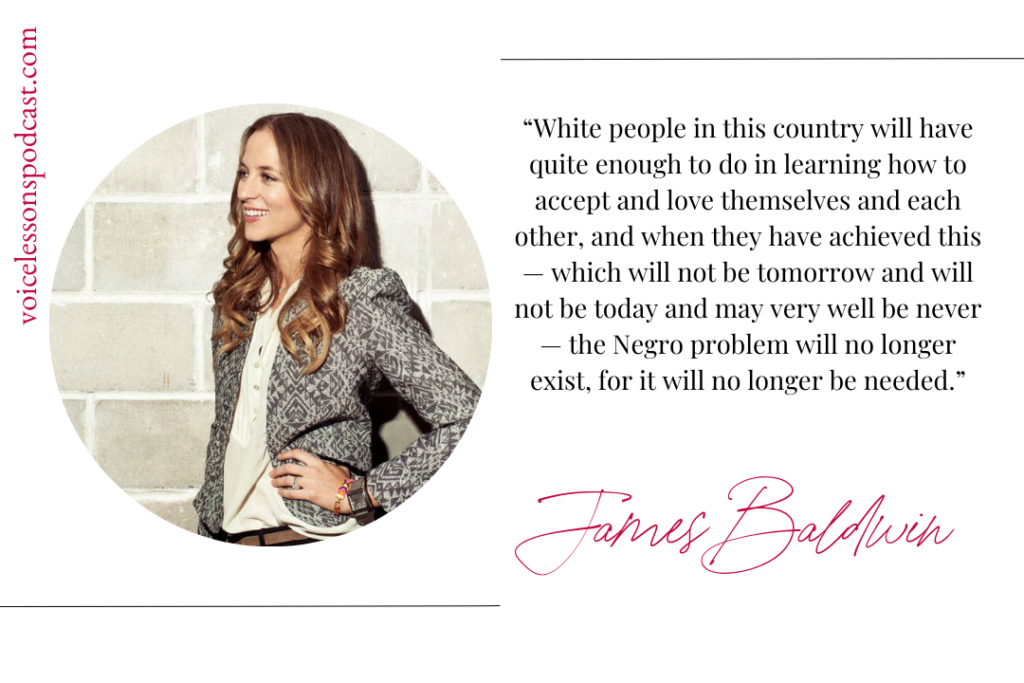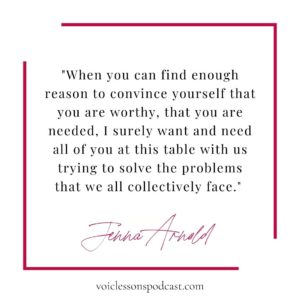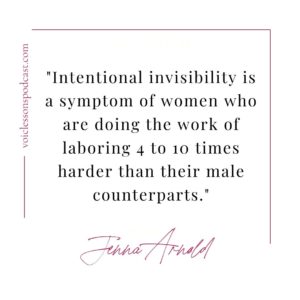A Lesson On Shedding The Perfection Performance With Jenna Arnold
In the wake of the 2016 election, activist, social entrepreneur, and organizer of the Women’s March, Jenna Arnold, one of Oprah’s SuperSoul 100 hosted listening circles around the country to understand why 51% of white women voted for Trump.
In the wake of the 2016 election, activist, social entrepreneur, and organizer of the Women’s March, Jenna Arnold, one of Oprah’s SuperSoul 100 hosted listening circles around the country to understand why 51% of white women voted for Trump. She wrote a book that captured those learnings called Raising Our Hands: How White Women Can Stop Avoiding Hard Conversations, Start Accepting Responsibility, and Find Our Place on the New Frontlines. In this episode, Jenna tells us how the Women’s March changed her and how white women can show up in this critical time in our history, accept responsibility, and find their place on the new frontlines.
 Jenna Arnold is the author of “Raising Our Hands”, an educator, social entrepreneur, activist, and mother who lives in New York City with her husband and two children. Jenna was one of the National Organizers of the Women’s March in 2017 and Oprah named her as one of her “100 Awakened Leaders who are using their voice and talent to elevate humanity”.
Jenna Arnold is the author of “Raising Our Hands”, an educator, social entrepreneur, activist, and mother who lives in New York City with her husband and two children. Jenna was one of the National Organizers of the Women’s March in 2017 and Oprah named her as one of her “100 Awakened Leaders who are using their voice and talent to elevate humanity”.For her work as the co-founder of ORGANIZE—an organization focused on ending the waitlist for organ transplants in the US, Jenna was named one of Inc Magazine’s “20 Most Disruptive Innovators” and the New York Times called it one of “the biggest ideas in social change”. Jenna created the hit TV show on MTV, ‘Exiled!’ which took spoiled American teenagers to live with indigenous cultures around the world and while at the United Nations, Jenna created multi-platform programming for MTV and Showtime with A-list celebrities like Jay-Z and Angelina Jolie. Jenna sits on the board of the Sesame Workshop Leadership Council and is a member of the Council on Foreign Relations.
LISTEN: APPLE PODCASTS | STITCHER | SPOTIFY
TOPICS DISCUSSED IN THIS EPISODE:
• The common theme in Jenna’s body of work and how she finds simplified, creative solutions to solve the world’s problems.
• How being dyslexic changes the world view.
• The founding story of the Women’s March and the most surprising thing Jenna learned about herself during the process of organizing it.
• What is a leaderless movement. Can they work?
• Women are trying to lead and topple systems at oppression at the same time.
• 74% of white women don’t engage in political conversation because it’s too uncomfortable, because it doesn’t keep the peace.
• What sparked Jenna to write her book, Raising Our Hands.
• Women are hesitant to step in and engage out of fear of not getting it perfect.
• How a woman’s self-worth, or lack of it, gets translated to our political actions and our world views.
• Why we are not willing to take responsibility for history.
• Why we are intentionally invisible in our daily lives.
• Money is an expression of an internal belief that we hold value.
• Things white women can do to take action and join the fight on the frontlines of change.
RESOURCES/ADDITIONAL INFORMATION:
Rasing Our Hands, Jenna Arnold
Jenna’s resources and recommended readings
“You cannot wake a person who is pretending to be asleep.” Navajo Proverb
#LESSONUP:
(4:26-4:54 ) One of my talents, which is such a weird thing to flaunt or say even about myself, but I say it only because somebody asked me this a number of months ago and forced me to think about what a very unique talent is that I have. And it’s one that I’m proud of. It came from my role as a first-grade teacher, but this idea of taking very complex subjects and making them easy to comprehend and making them easy to wrap one’s arms around.
(12:43- 13:40) I think the challenge though resides in the fact that we’ve all been trained in a very patriarchal way. If you look at indigenous communities that were matriarchal societies. I do think women inherently lead differently. Not that they can, not that they’re different than men, but just because our society raises us differently. I think we’re pushing up against patriarchal rules, a blueprint that lacks emotion, that lacks intuition. And then on top of that, there’s a different challenge in how women are accepted broadly as the leaders. And then obviously how women accept other women as leaders.
(10:45- 12:10) I wrote the book because I needed to read the book. I was trying to add up a number of different variables immediately after the 2016 election. That statistic that 51% of American white women voted for Donald Trump in 2016, standing on stage at the Women’s March looking out at a sea of pink hats that seem to be broadly speaking worn by mostly white women. And then trying to add that up with the relationship that I have with a lot of well-intended kind generous white women in my life, that I was having a really hard time with what I was seeing happening politically, what I was seeing happening as part of the movement. And then the identity of which I know intimately as the suburbs middle-class white woman raised in the suburbs of Philadelphia. Something wasn’t adding up.Their intention and what it is that they wanted to offer the world. And then also then how we elected that particular candidate.
(19:12-19:58) The conversation that I think they’re least willing to have is how they define, protect, use, understand their self-worth and how that then gets translated into giving a sh** about the rest of the world. And that giving a sh**ness can be in the form of many different actions, be it in the voting booth, be it in the reallocating resources, be it in the screaming at the top of their lungs or sitting there quietly and learning. And what I found most surprising, which is I’m still wrestling with and trying to unpack this a bit, but this idea of a low-grade fever. That’s exactly what it was like a low-grade fever of self-hate and self-disappointment that seemed to exist no matter where it was.
(22:49- 23:00) Intentional invisibility is a symptom of women who are doing the work of laboring 4 to10X harder than their male counterparts.
(23:52- 25:30) Here are all of the women who have come before us who worked so hard to get us to where we are, be it, the vote, be it, the right to work, be it the freedom to have a credit card, be it the freedom to be able to have children and go back to work or have the children and not go back to work. This idea of all these women have worked so hard to let us attain all of this, but what they didn’t do is decrease the bar of attainment or the quality of the bar of attainment. We used to be the home keepers and the children raisers and the meal cookers. And we had to do it all perfectly. And now we’re allowed to work, but we have to have the perfect job and the perfect title. And now we’re allowed to be athletic, but we have to have the perfect body. And so this idea of like perfection still hasn’t been shed and men don’t have that same level of perfection. So they’re held up to different self standards.
(29:10-30:20) When you can get out of your own way, you no longer have to prove things to this invisible bleacher of faults that we have in our heads.
(33:20-33:56) When you are truly authentically human and humble and open, I would argue that it’s an impossibility to continue to do harm. There is a very fine line between being complacent and saying, well, I’m not going to do it. I’m going to be Switzerland here. And then letting somebody else suffer.
(38:58-39:40) But this December, we moved into the age of Aquarius 200 year window, where femininity is to be centered. And maybe this is part of the equalizing of the past 200 or 400 years that needed to happen. And so I’m very excited to just, as chapter one says, shut up and move out of the way. And then on the same flip of a dime, if I need to rage like a lion, I will. The people who hear my voice, hopefully, more than anyone else are communities that don’t have access to other voices representing different types of communities. And so I hope to be a gatekeeper to that. That’s why I wrote the book is just to say, Hey, come here for a second. Like, this includes you.
PIN IT:

